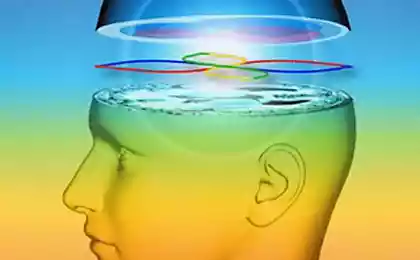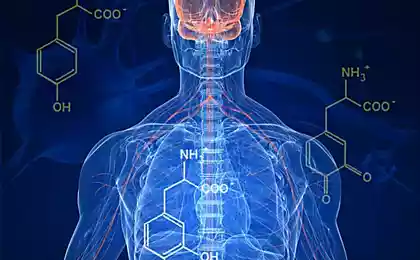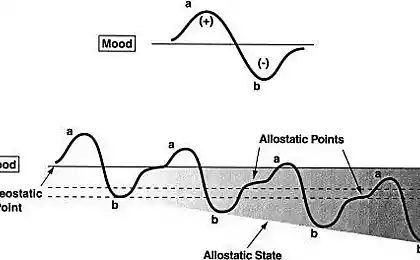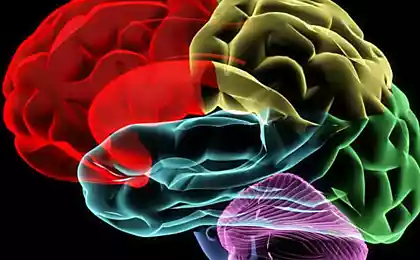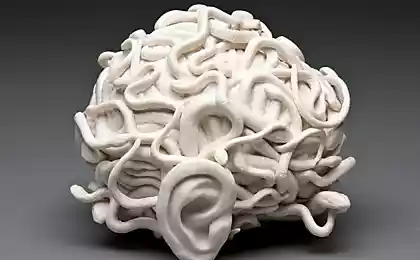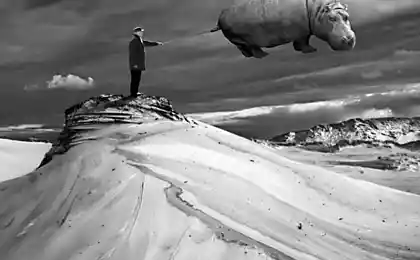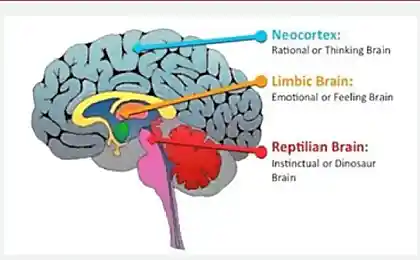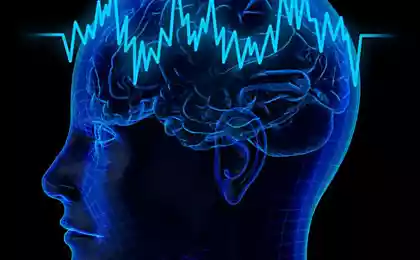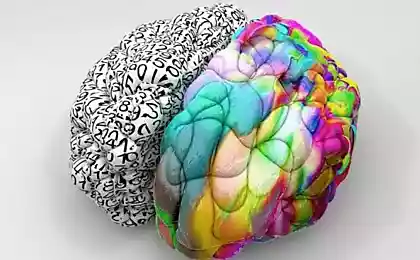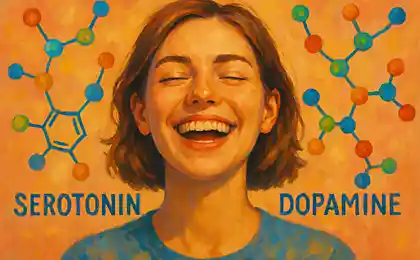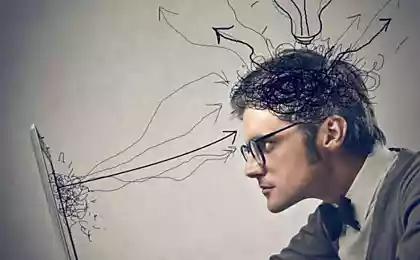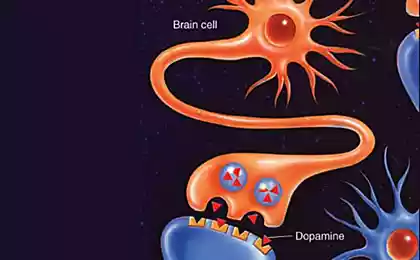997
Dopamine is the greatest deception of the brain or emotionally not to fade
Continuing the theme raised in the article dopamine Levels: how to regain the pleasure.Brain cells (neurons) transmit signals to each other with the help of special substances called neurotransmitters. The original language of cells. Neurotransmitters in the brain several, today we are going to talk about dopamine (dopamine). For simplicity, we will analyze it in two ways. 1. Do not press the pedal. How can you burn your dopamine receptors. As you are playing. Dependence and neuromarketing. 2. What to do to restore and maintain a healthy dopamine system.
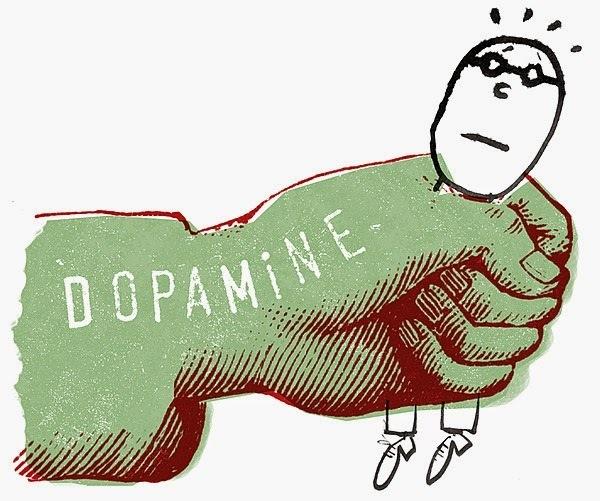
The main functions of the dopamine system: 1. Causes us to achieve goals, promising at the same mountains of gold (reward system) 2. Helps switch from one task to another. 3. Stands out at the thought of the reward. 4. Falls at the thought of failing to achieve the award 5. Helps you to focus on what is important to you. 6. Just say about cheating: dopamine gives you only a promise of happiness, but not happiness itself! Again: most people confuse the promise scatsta and happiness, but it is absolutely different things! Not to be confused! So 1. The promotion system. Dopamine is one of the factors internal reinforcements and serves as an important part of the "reward system" of the brain because it produces a feeling of pleasure (or satisfaction), what affects the processes of motivation and learning. When we have a need, released dopamine, which makes us move and take action to achieve the goal. In 2001, Stanford neuroscientist Brian Knutson has published a convincing study which proved that dopamine is responsible for the anticipation, and not for experience awards. Dopamine is naturally produced in large quantities during a positive, subjective view of human experience — for example, sex, eating delicious food, pleasant bodily sensations, achieve goals, etc. Neurobiological experiments have shown that even memories of positive encouragement can increase the level of dopamine, so this neurotransmitter is used by the brain for evaluation and motivation, consolidating important for the survival and procreation of the action. A key element of the brain reward system is a network of mesolimbic dopamine neurons — nerve cells located in the ventral region of tyre (SPM-VTA) at the base of the brain and send projections to the various divisions of the front part of the brain, mainly the nucleus accumbens (nucleus accumbens). Neurons VOP release from axonal terminals, the neurotransmitter dopamine binds to a corresponding receptor neurons of the nucleus accumbens. Dopamine nerve pathway from a GP in the nucleus accumbens plays an important role in the development of narcotic addiction: animals with damage to these brain structures completely lose interest in drugs.
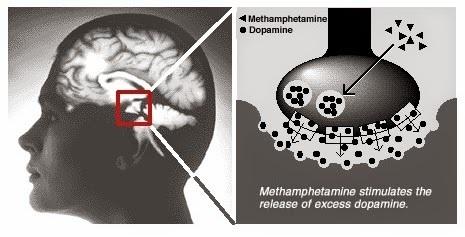
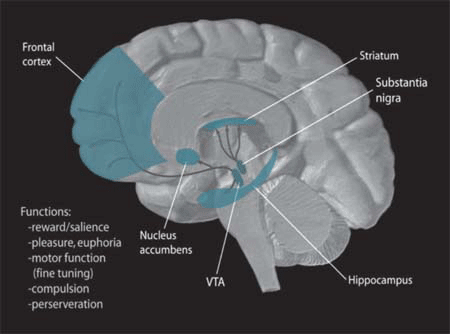
The excess ofthe DeficitNormof Dependence (amphetamine)Addiction (substance abuse, alcohol abuse)Healthy relationships Impulsivity Depression Feelings of well-being, satisfaction Mania Hedonia (inability to experience pleasure) Pleasure and reward when you do it is Sexual fetishism a Lack of ambition and drive Healthy libido Sexual addiction Inability to long privjazannostei Attachment, the ability to share feelings an Unhealthy craving for the risk of Low libido Motivated Aggression Erectile dysfunction Healthy risk assessment Psychosis Social phobias and anxiety disorders, compulsive disorder Deep balanced choice Schizophrenia Parkinson Realistic expectations the ability to enjoy the little things Locomotor hyperactivity inconsistent and interrupted thought processes characteristic of schizophrenia.
If the environment causes hyperstimulation, excessively high level of dopamine leads to arousal and increased energy, which then changed to suspicion and paranoia.
When it is too high, the focus becomes narrowed and intense.
A bad dream, "restless legs syndrome" With too low a level of dopamine, we lose the ability to concentrate. Too low-level cognitive problems (poor memory and poor learning ability), lack of concentration, difficulties in the initialization or the completion of various tasks, lack of ability to concentrate on assignments, and a conversation with someone, lack of energy, motivation, inability to enjoy life, bad habits and desires, compulsions, lack of pleasure from activities that were previously enjoyable, and slowed motor movements.
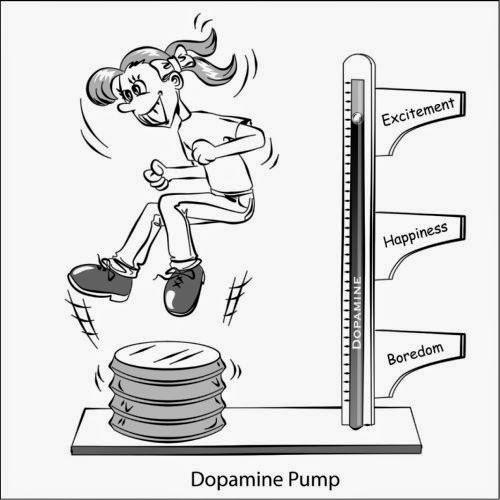
2. Activation of dopaminergic transmission is necessary when processes of switching of attention from one stage of cognitive activity to another. Thus, the failure of dopaminergic transmission leads to increased inactivity of the patient, which clinically manifested by amelineau cognitive processes (bradyphrenia) and perseveration (mysoline the same). 3. Why we are happy from thinking about the upcoming fun? Why we can spend hours to savor the upcoming pleasure? Recent studies show that the production of dopamine begins in the waiting process fun. This is very important. Reflections will drive up the dopamine and desire will increase even more. How to burn receptors. Burns anything that stimulates dopamine, but does not satisfy the needs (health resources). 1. Drugs (nicotine, alcohol) 2. Addiction (sweet, porn, lottery, casino, etc.) 3. Dependent behaviour, aggression (violence), etc. 1. Drugs irreversibly (trudnoobogatimye) change dopamine neurons. As with any pleasure, which is strong and frequent. In particular, many drugs increase the production and release of dopamine in the brain 5-10 times, allowing the people who use them, to feeling of pleasure artificially. Thus, the amphetamine directly stimulates the release of dopamine, affecting the mechanism of its transportation. Other drugs, like cocaine and other psychostimulants, blocking the natural mechanisms of dopamine reuptake, increasing its concentration in the synaptic space. Morphine and nicotine mimic the action of natural neurotransmitters, and alcohol blocks the action of dopamine antagonists. If the patient continues to prestimulate their "reward system", the brain gradually adapts to artificially raise the level of dopamine by producing less of the hormone and reducing the number of receptors in the "reward system", one of the factors motivating the addict to increase the dose to get the same effect. Further development of chemical tolerance can gradually lead to metabolic disturbances in the brain, and in the long run, potentially cause serious damage to the health of the brain. Further studies showed that dopamine in the mesolimbic system of animals and humans rising from the delicious food, pleasant bodily sensations, sex, and associated thoughts. Accordingly, dopamine is dropping sharply there of hunger, cold, pain, unpleasant bodily sensations associated with these thoughts. That is, the increase of dopamine in mesolimbic tags useful for survival and reproduction operation, a drop in dopamine — mark harmful and dangerous actions. The increase of dopamine in mesolimbic produces a feeling of pleasureand decrease the feeling of painthat then is written into the memory, neural connections associated with this action, and helps people and animals to determine whether it is necessary again to do this action in the future, or should it be avoided. In addition, activation/deactivation of some divisions of the "system of incentives" (in particular "ventral tegmental area") affects prefrontal cortex (mesocortical path), which is responsible for movement and decision-making, and thus affects whether a person to execute his plan earlier action or not. According to very popular in the neuroscience of "theory of Hebb", if the activation of the neurons is strong enough, between the neurons which aktiviziruyutsya at the same time can occur new interneuronal connections, and existing interneuronal connections can be destroyed if already associated neurons do not aktiviziruyutsya at the same time for some reason.[65] that is, the thought also vlyayut on the structure of the intercellular connections between neurons (synapses), and then the edit links changes the flow of neurotransmitters through the neurons. Thus, the idea affects the architecture of neural connections and in the production of neurotransmitters in the brain, and Vice versa — neurotransmitters and the existing architecture of neurons influence the next person's thoughts. In nature, these automated "associativity" is usually useful, and even necessary for decision-making, because in the wild animals have no drug, but a natural "reward system" in the process of evolution has created enough checks and balances so that the animal can't hurt itself. For example, if eating an animal causes pain in the stomach, decreasing dopamine; after orgasm produces glutamate which dramatically lowers the production of dopamine after sex, the animal rested; and if the animal will be a long time to think about something unproductive, hunger, cold and predators can be quickly reminded of reality. When a person decides to do or not some action, usually it first looks in the memory of similar circumstances. If it turns out that in the past he had exactly the same problem, he remembers how he fixed it, remember that this decision was taken then fun, and since there was no new neural connections which would tmakarovoy the old decision as wrong, the person often spends a lot of time to think, and quickly takes recorded earlier decision quickly or repeats previous decision logic. There are also many studies demonstrating that dopamine is necessary for remembering and forgetting. If any event was a very pleasant or very unpleasant, he drew particular attention to it, i.e., the dopamine increases associated with this event different neurotransmitters, and this event is well remembered, and that was indifferent (dopamine remained at a normal level) is quickly forgotten. Thus, dopamine is a neurotransmitter in the brain which perform two important functions: it serves as the neurotransmitter for the promotion and is used in the system of assessment and motivation. Dopamine is also needed for memory, decision-making and learning. For example, when healthy laboratory mice artificially blocked the dopamine, they were sitting in one place for hours, ignoring food, sex and entertainment, and nearly died from exhaustion. With a few exceptions, this system controls not as much reward, how much punishment, by overlapping dopamine. In such cases, the level of dopamine drops causing us to take action. In the end, the reward system is briefly returns dopamine and we feel good about. This same mechanism works when you win at a sporting event, praise or condemnation of others, etc. Drop in dopamine customize us to achieve goals that can be achieved at the cost of overexertion and stress. So what happens when artificially increasing the level of dopamine? Of course the failure of the "system of incentives". The brain can no longer correctly decide what is good and what is bad. Sensations bring more pleasure than usual, the colors are beautiful and bright, hands-free voice and rich timbre, any Association seem to be possible and reliable. Almost any first came the thought seems correct and interesting. The brain becomes harder to switch the impression coming from the real world, because on the inside everything suddenly became so interesting and important. When taking light doses of narcotics the brain and how some can control themselves, but with increasing doses, dopamine rises above critical levels and the brake pedal thoughts (glutamate) is almost not working — comes acute psychosis. The man himself is no longer controls literally. After the action of the drug there is a sharp drop in the level of neurotransmitters, anxiety and raskayanie, why the levels of neurotransmitters falls below normal. The addict from experiencing this frustration, and after a while it is all great joy to bring memories of the "high" and again he reaches for the drug... Scientists found that the brain reward system drugs have a stronger and deeper stimulating effect than any natural factors reward. If the addict will not stop this cycle, then in real life start problems (loss of job, friends, family). From painful thoughts about reality faded dopamine levels will decline even more, and even more will want to leave in an unreal world. Everything else will gradually begin to lose value. Spoiled dopamine, the brain may temporarily revise the level of the "norm" for the flow of dopamine in the direction of increasing, and then the natural pleasure (food, sex, socializing with others) will not be considered as adequate remuneration. With conventional natural pleasures will begin to associate rather unpleasant memories (loss of social status, rejection by society, impotence, loss of taste of food, etc.). And in the future with regular use at the same time decreasing the sensitivity of dopamine receptors. The stronger and more regular exposure, the greater the consequences. Sensitivity reduction occurs through a decrease in the density of receptors per unit area of the cell membrane, where they are located). Probably all imagine the person under the haloperidol? Here it awaits anyone who kills your dopamine receptors. Incidentally, in the brain not so much compared to the other, only about 400 thousand (to understand the scale: our brains are about 100 billion nerve cells). Restored they are long and painful, some studies say up to 3-4 years, with different types of receptors at different speeds. And, what's worse, it is the D2 receptor restored the worst. Well chronic a mockery of dopamine receptors leads to the expression of the gene responsible for their synthesis, and from then on have to live at all without them. Aggression. Dopamine is released and during the aggression. In one cage held a male and female. Next to them were five strangers mice. After that, the female was removed from the cells and to the male tucked former neighbors. The male is quite aggressive response: biting or otherwise attacking outsiders. Later, the cells were added the button that the mouse had to press your nose if you wanted “extra” was deleted. Quickly mastered the mouse is constantly clicked on. After that, the same male was made the injection of the drug, which suppressed the sensitivity of dopamine receptors — and he almost stopped pushing the button. Thus, the authors of the experiment concluded that while aggression in mice produced by dopamine. However there is also a more complex relationship:it Turned out that the volunteers with low levels of dopamine were much less persistent in trying to win money and at the same time, actively showed aggressive behavior. Meanwhile, until now it was assumed that stimulate aggression only high levels of dopamine. As a system of reinforcement causes us to act? When the brain sees the possibility of rewards, it secretes the neurotransmitter dopamine. Dopamine tells the rest of the brain to focus on this award and in whatever was to get it in our greedy little hands. A surge of dopamine itself does not cause happiness, rather just a turn-on. We are playful, cheerful and enthusiastic. We can smell an opportunity of fun and willing to work hard to achieve it. Dopamine is responsible for the action, and not for happiness. The promise of reward was necessary in order not to miss the bus win. When excited, the reinforcement system, they worried anticipation, not pleasure. With the influx of dopamine, this new object of desire, it seems critically necessary to survive. When dopamine capture our attention, the brain orders us to get the object or to repeat what we drew. Evolution't care about happiness, but she promises him to fight for life. Therefore, the expectation of happiness — not the direct experience, the brain uses so we continued to hunt, gather, work and marriage. According to the new theory, which was discussed at the recent Chicago Congress of Neurological society, dopamine is associated not so much with pleasure as with objectives, necessary for survival, and their implementation. Dopamine also plays an important role in the registration of brain changes and features of the environment. "It is impossible to pay attention to everything, — continues Dr. Volkov, but it is important to notice everything new and unusual. You may not notice flying in the air fly, but if, say, a fly suddenly will glow in the dark, dopamine will give the signal." In addition, dopamine detector elementary features focuses on objects with for you high value like those that you love, or those that cause you fear. For example, if you love chocolate, most likely dopamine neurons will light up at the sight lying on the counter of the little cocoa bean. But if you fear cockroaches, those same neurons will give an even stronger signal, if "Bob" will show six legs. Of course, we now live in a completely different world. Take, for example, the surge of dopamine from the sight, smell or taste fatty or sugary foods. The release of dopamine ensures that we want to overeat to satiety. A wonderful instinct, if you live in a world where much food. However, in our environment the food is not only widely available but is prepared to maximize dopamine response, so each surge — path to obesity and not to longevity. Or think about the impact of sexual images on our system reinforcements. For almost all of human history naked people took a seductive pose just before the real partners. Of course, a weak desire to act in such a situation it would be unwise, if you wanted to keep in the gene pool of their DNA. But after several hundred thousand years we were in a world where Internet porn is always available, not to mention the ubiquitous sexual images in advertising and the entertainment industry. In a fit of prosecution of each sexual "opportunities" people hang out on porn sites and become victims of advertising campaigns that use sex to sell everything from deodorant to designer jeans. So porn also burns out your dopamine receptors. The key action, which we do on the Internet is a perfect metaphor for the promise of a reward: we are looking for. Looking for. And again, looking for, clicking the mouse, like... like a rat in a cage, hoping for the next "hit", waiting for the elusive reward that will finally give us a feeling of fullness. Perhaps the cell phone, surfing the Internet and social networks accidentally exploit our system of reinforcements, but the developers of computer and video games deliberately manipulate her to plant players. The promise that the transition to the next level or a great victory can happen at any time — that's what makes the game so attractive. And so it is so hard to put down. In one study it was found that a video game causes a surge of dopamine, comparable to the use of amphetamines: dopamine is accompanied by fever and drug dependencies. You can't predict when we will receive the scores or will be taken to another level, that's why your dopaminergic neurons continue to fire, and you stick to the chair. Someone thinks it's a wonderful distraction, and someone is immoral exploitation of players. We seek pleasures, and often the cost of their own well-being. When dopamine directs our brain to search rewards, we become risky, impulsive — crazy personalities. But what is especially important, even if we don't get the rewards it promises — and fear to lose her quite, to keep us on the hook. If you are a lab rat, you will press the lever until they drop exhausted or starving. If you are a person, at best you have an empty wallet and heavier stomach. In the worst case you can discover what captivated yourself in a whirlpool of addictions and compulsive actions. When the promise of a reward released dopamine, it makes you more susceptible to temptation. For example, after admiring the erotic images, men are more prone to financial risks, and fantasies about winning the lottery leads to overeating — both dreams of the unattainable rewards can hurt you. High levels of dopamine increases the appeal of momentary pleasure, and you are not so concerned about long-term consequences.
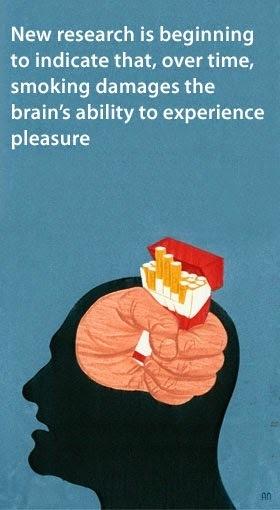
If we stop and observe what is really happening with our brain and body when we are in a state of volition, we find that the promise of a reward can be as stressful as it is delightful. Desire does not always gives us pleasure — sometimes we he pre - gross. All because the main function of dopamine is to make us pursue happiness, not make you happy. He didn't mind a bit to push us, even if we have hard times. To encourage you to seek out the object of your passion, the reinforcement system has two tools: a carrot and a stick.The carrot, of course, the promise of a reward. Dopaminergic neurons cause this feeling, telling other areas of the brain to anticipate pleasure and plan. When these areas are bathed in dopamine, there is a desire — the carrot that makes you jump forward. But the reinforcement system there is a second weapon, which is strongly reminiscent of the proverbial whip. When the reinforcement system secretes dopamine, it also sends a message to the center of stress. In this area of the brain dopamine begins to release stress hormones. The result: you are nervous in anticipation of the object of desire. Need to get what you want seems to be already a matter of life and death, a matter of survival.
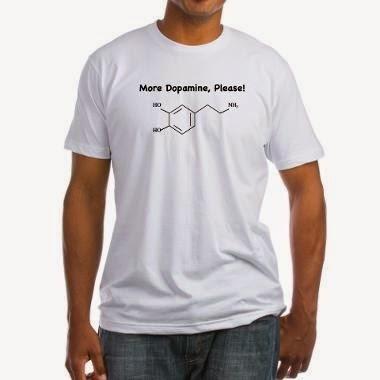
The researchers observed this combination of desire and stress in women who want chocolate. When they were shown images of chocolate, they shuddered. This physiological reflex associated with alarm and arousal — so notice the predator in the wild. Women reported that at the same time felt a desire and worry as well as feeling like they couldn't control himself. When we are immersed in a similar state, attributed pleasure to the object that fired the dopamine response, and stress the fact that this thing we have. We do not notice that the object causes of desire and anticipation of pleasure and stress at the same time. published Andrey Blueskin, doctor, candidate of medical Sciences. Sources: 1. Kelly Mcgonigal (Kelly McGonigal) "willpower" is a great book, we strongly advise you to read.2.The dopamine theory of schizophrenia and self-stimulation (updated variant)neuroleptic.ru/forum/topic/6041-%D1%81%D0%BD%D0%BE%D0%B2%D0%B0-%D0%BF%D1%80%D0%BE-%D0%B4%D0%BE%D1%84%D0%B0%D0%BC%D0%B8%D0%BD%D0%BE%D0%B2%D1%83%D1%8E-%D0%B3%D0%B8%D0%BF%D0%BE%D1%82%D0%B5%D0%B7%D1%83/ 3. Dopamine shevchouk.comP.S. And remember, only by changing their consumption — together we change the world! ©
Join us in Facebook , Vkontakte, Odnoklassniki
Source: www.beloveshkin.com/2014/12/dopamine-1.html

The main functions of the dopamine system: 1. Causes us to achieve goals, promising at the same mountains of gold (reward system) 2. Helps switch from one task to another. 3. Stands out at the thought of the reward. 4. Falls at the thought of failing to achieve the award 5. Helps you to focus on what is important to you. 6. Just say about cheating: dopamine gives you only a promise of happiness, but not happiness itself! Again: most people confuse the promise scatsta and happiness, but it is absolutely different things! Not to be confused! So 1. The promotion system. Dopamine is one of the factors internal reinforcements and serves as an important part of the "reward system" of the brain because it produces a feeling of pleasure (or satisfaction), what affects the processes of motivation and learning. When we have a need, released dopamine, which makes us move and take action to achieve the goal. In 2001, Stanford neuroscientist Brian Knutson has published a convincing study which proved that dopamine is responsible for the anticipation, and not for experience awards. Dopamine is naturally produced in large quantities during a positive, subjective view of human experience — for example, sex, eating delicious food, pleasant bodily sensations, achieve goals, etc. Neurobiological experiments have shown that even memories of positive encouragement can increase the level of dopamine, so this neurotransmitter is used by the brain for evaluation and motivation, consolidating important for the survival and procreation of the action. A key element of the brain reward system is a network of mesolimbic dopamine neurons — nerve cells located in the ventral region of tyre (SPM-VTA) at the base of the brain and send projections to the various divisions of the front part of the brain, mainly the nucleus accumbens (nucleus accumbens). Neurons VOP release from axonal terminals, the neurotransmitter dopamine binds to a corresponding receptor neurons of the nucleus accumbens. Dopamine nerve pathway from a GP in the nucleus accumbens plays an important role in the development of narcotic addiction: animals with damage to these brain structures completely lose interest in drugs.


The excess ofthe DeficitNormof Dependence (amphetamine)Addiction (substance abuse, alcohol abuse)Healthy relationships Impulsivity Depression Feelings of well-being, satisfaction Mania Hedonia (inability to experience pleasure) Pleasure and reward when you do it is Sexual fetishism a Lack of ambition and drive Healthy libido Sexual addiction Inability to long privjazannostei Attachment, the ability to share feelings an Unhealthy craving for the risk of Low libido Motivated Aggression Erectile dysfunction Healthy risk assessment Psychosis Social phobias and anxiety disorders, compulsive disorder Deep balanced choice Schizophrenia Parkinson Realistic expectations the ability to enjoy the little things Locomotor hyperactivity inconsistent and interrupted thought processes characteristic of schizophrenia.
If the environment causes hyperstimulation, excessively high level of dopamine leads to arousal and increased energy, which then changed to suspicion and paranoia.
When it is too high, the focus becomes narrowed and intense.
A bad dream, "restless legs syndrome" With too low a level of dopamine, we lose the ability to concentrate. Too low-level cognitive problems (poor memory and poor learning ability), lack of concentration, difficulties in the initialization or the completion of various tasks, lack of ability to concentrate on assignments, and a conversation with someone, lack of energy, motivation, inability to enjoy life, bad habits and desires, compulsions, lack of pleasure from activities that were previously enjoyable, and slowed motor movements.

2. Activation of dopaminergic transmission is necessary when processes of switching of attention from one stage of cognitive activity to another. Thus, the failure of dopaminergic transmission leads to increased inactivity of the patient, which clinically manifested by amelineau cognitive processes (bradyphrenia) and perseveration (mysoline the same). 3. Why we are happy from thinking about the upcoming fun? Why we can spend hours to savor the upcoming pleasure? Recent studies show that the production of dopamine begins in the waiting process fun. This is very important. Reflections will drive up the dopamine and desire will increase even more. How to burn receptors. Burns anything that stimulates dopamine, but does not satisfy the needs (health resources). 1. Drugs (nicotine, alcohol) 2. Addiction (sweet, porn, lottery, casino, etc.) 3. Dependent behaviour, aggression (violence), etc. 1. Drugs irreversibly (trudnoobogatimye) change dopamine neurons. As with any pleasure, which is strong and frequent. In particular, many drugs increase the production and release of dopamine in the brain 5-10 times, allowing the people who use them, to feeling of pleasure artificially. Thus, the amphetamine directly stimulates the release of dopamine, affecting the mechanism of its transportation. Other drugs, like cocaine and other psychostimulants, blocking the natural mechanisms of dopamine reuptake, increasing its concentration in the synaptic space. Morphine and nicotine mimic the action of natural neurotransmitters, and alcohol blocks the action of dopamine antagonists. If the patient continues to prestimulate their "reward system", the brain gradually adapts to artificially raise the level of dopamine by producing less of the hormone and reducing the number of receptors in the "reward system", one of the factors motivating the addict to increase the dose to get the same effect. Further development of chemical tolerance can gradually lead to metabolic disturbances in the brain, and in the long run, potentially cause serious damage to the health of the brain. Further studies showed that dopamine in the mesolimbic system of animals and humans rising from the delicious food, pleasant bodily sensations, sex, and associated thoughts. Accordingly, dopamine is dropping sharply there of hunger, cold, pain, unpleasant bodily sensations associated with these thoughts. That is, the increase of dopamine in mesolimbic tags useful for survival and reproduction operation, a drop in dopamine — mark harmful and dangerous actions. The increase of dopamine in mesolimbic produces a feeling of pleasureand decrease the feeling of painthat then is written into the memory, neural connections associated with this action, and helps people and animals to determine whether it is necessary again to do this action in the future, or should it be avoided. In addition, activation/deactivation of some divisions of the "system of incentives" (in particular "ventral tegmental area") affects prefrontal cortex (mesocortical path), which is responsible for movement and decision-making, and thus affects whether a person to execute his plan earlier action or not. According to very popular in the neuroscience of "theory of Hebb", if the activation of the neurons is strong enough, between the neurons which aktiviziruyutsya at the same time can occur new interneuronal connections, and existing interneuronal connections can be destroyed if already associated neurons do not aktiviziruyutsya at the same time for some reason.[65] that is, the thought also vlyayut on the structure of the intercellular connections between neurons (synapses), and then the edit links changes the flow of neurotransmitters through the neurons. Thus, the idea affects the architecture of neural connections and in the production of neurotransmitters in the brain, and Vice versa — neurotransmitters and the existing architecture of neurons influence the next person's thoughts. In nature, these automated "associativity" is usually useful, and even necessary for decision-making, because in the wild animals have no drug, but a natural "reward system" in the process of evolution has created enough checks and balances so that the animal can't hurt itself. For example, if eating an animal causes pain in the stomach, decreasing dopamine; after orgasm produces glutamate which dramatically lowers the production of dopamine after sex, the animal rested; and if the animal will be a long time to think about something unproductive, hunger, cold and predators can be quickly reminded of reality. When a person decides to do or not some action, usually it first looks in the memory of similar circumstances. If it turns out that in the past he had exactly the same problem, he remembers how he fixed it, remember that this decision was taken then fun, and since there was no new neural connections which would tmakarovoy the old decision as wrong, the person often spends a lot of time to think, and quickly takes recorded earlier decision quickly or repeats previous decision logic. There are also many studies demonstrating that dopamine is necessary for remembering and forgetting. If any event was a very pleasant or very unpleasant, he drew particular attention to it, i.e., the dopamine increases associated with this event different neurotransmitters, and this event is well remembered, and that was indifferent (dopamine remained at a normal level) is quickly forgotten. Thus, dopamine is a neurotransmitter in the brain which perform two important functions: it serves as the neurotransmitter for the promotion and is used in the system of assessment and motivation. Dopamine is also needed for memory, decision-making and learning. For example, when healthy laboratory mice artificially blocked the dopamine, they were sitting in one place for hours, ignoring food, sex and entertainment, and nearly died from exhaustion. With a few exceptions, this system controls not as much reward, how much punishment, by overlapping dopamine. In such cases, the level of dopamine drops causing us to take action. In the end, the reward system is briefly returns dopamine and we feel good about. This same mechanism works when you win at a sporting event, praise or condemnation of others, etc. Drop in dopamine customize us to achieve goals that can be achieved at the cost of overexertion and stress. So what happens when artificially increasing the level of dopamine? Of course the failure of the "system of incentives". The brain can no longer correctly decide what is good and what is bad. Sensations bring more pleasure than usual, the colors are beautiful and bright, hands-free voice and rich timbre, any Association seem to be possible and reliable. Almost any first came the thought seems correct and interesting. The brain becomes harder to switch the impression coming from the real world, because on the inside everything suddenly became so interesting and important. When taking light doses of narcotics the brain and how some can control themselves, but with increasing doses, dopamine rises above critical levels and the brake pedal thoughts (glutamate) is almost not working — comes acute psychosis. The man himself is no longer controls literally. After the action of the drug there is a sharp drop in the level of neurotransmitters, anxiety and raskayanie, why the levels of neurotransmitters falls below normal. The addict from experiencing this frustration, and after a while it is all great joy to bring memories of the "high" and again he reaches for the drug... Scientists found that the brain reward system drugs have a stronger and deeper stimulating effect than any natural factors reward. If the addict will not stop this cycle, then in real life start problems (loss of job, friends, family). From painful thoughts about reality faded dopamine levels will decline even more, and even more will want to leave in an unreal world. Everything else will gradually begin to lose value. Spoiled dopamine, the brain may temporarily revise the level of the "norm" for the flow of dopamine in the direction of increasing, and then the natural pleasure (food, sex, socializing with others) will not be considered as adequate remuneration. With conventional natural pleasures will begin to associate rather unpleasant memories (loss of social status, rejection by society, impotence, loss of taste of food, etc.). And in the future with regular use at the same time decreasing the sensitivity of dopamine receptors. The stronger and more regular exposure, the greater the consequences. Sensitivity reduction occurs through a decrease in the density of receptors per unit area of the cell membrane, where they are located). Probably all imagine the person under the haloperidol? Here it awaits anyone who kills your dopamine receptors. Incidentally, in the brain not so much compared to the other, only about 400 thousand (to understand the scale: our brains are about 100 billion nerve cells). Restored they are long and painful, some studies say up to 3-4 years, with different types of receptors at different speeds. And, what's worse, it is the D2 receptor restored the worst. Well chronic a mockery of dopamine receptors leads to the expression of the gene responsible for their synthesis, and from then on have to live at all without them. Aggression. Dopamine is released and during the aggression. In one cage held a male and female. Next to them were five strangers mice. After that, the female was removed from the cells and to the male tucked former neighbors. The male is quite aggressive response: biting or otherwise attacking outsiders. Later, the cells were added the button that the mouse had to press your nose if you wanted “extra” was deleted. Quickly mastered the mouse is constantly clicked on. After that, the same male was made the injection of the drug, which suppressed the sensitivity of dopamine receptors — and he almost stopped pushing the button. Thus, the authors of the experiment concluded that while aggression in mice produced by dopamine. However there is also a more complex relationship:it Turned out that the volunteers with low levels of dopamine were much less persistent in trying to win money and at the same time, actively showed aggressive behavior. Meanwhile, until now it was assumed that stimulate aggression only high levels of dopamine. As a system of reinforcement causes us to act? When the brain sees the possibility of rewards, it secretes the neurotransmitter dopamine. Dopamine tells the rest of the brain to focus on this award and in whatever was to get it in our greedy little hands. A surge of dopamine itself does not cause happiness, rather just a turn-on. We are playful, cheerful and enthusiastic. We can smell an opportunity of fun and willing to work hard to achieve it. Dopamine is responsible for the action, and not for happiness. The promise of reward was necessary in order not to miss the bus win. When excited, the reinforcement system, they worried anticipation, not pleasure. With the influx of dopamine, this new object of desire, it seems critically necessary to survive. When dopamine capture our attention, the brain orders us to get the object or to repeat what we drew. Evolution't care about happiness, but she promises him to fight for life. Therefore, the expectation of happiness — not the direct experience, the brain uses so we continued to hunt, gather, work and marriage. According to the new theory, which was discussed at the recent Chicago Congress of Neurological society, dopamine is associated not so much with pleasure as with objectives, necessary for survival, and their implementation. Dopamine also plays an important role in the registration of brain changes and features of the environment. "It is impossible to pay attention to everything, — continues Dr. Volkov, but it is important to notice everything new and unusual. You may not notice flying in the air fly, but if, say, a fly suddenly will glow in the dark, dopamine will give the signal." In addition, dopamine detector elementary features focuses on objects with for you high value like those that you love, or those that cause you fear. For example, if you love chocolate, most likely dopamine neurons will light up at the sight lying on the counter of the little cocoa bean. But if you fear cockroaches, those same neurons will give an even stronger signal, if "Bob" will show six legs. Of course, we now live in a completely different world. Take, for example, the surge of dopamine from the sight, smell or taste fatty or sugary foods. The release of dopamine ensures that we want to overeat to satiety. A wonderful instinct, if you live in a world where much food. However, in our environment the food is not only widely available but is prepared to maximize dopamine response, so each surge — path to obesity and not to longevity. Or think about the impact of sexual images on our system reinforcements. For almost all of human history naked people took a seductive pose just before the real partners. Of course, a weak desire to act in such a situation it would be unwise, if you wanted to keep in the gene pool of their DNA. But after several hundred thousand years we were in a world where Internet porn is always available, not to mention the ubiquitous sexual images in advertising and the entertainment industry. In a fit of prosecution of each sexual "opportunities" people hang out on porn sites and become victims of advertising campaigns that use sex to sell everything from deodorant to designer jeans. So porn also burns out your dopamine receptors. The key action, which we do on the Internet is a perfect metaphor for the promise of a reward: we are looking for. Looking for. And again, looking for, clicking the mouse, like... like a rat in a cage, hoping for the next "hit", waiting for the elusive reward that will finally give us a feeling of fullness. Perhaps the cell phone, surfing the Internet and social networks accidentally exploit our system of reinforcements, but the developers of computer and video games deliberately manipulate her to plant players. The promise that the transition to the next level or a great victory can happen at any time — that's what makes the game so attractive. And so it is so hard to put down. In one study it was found that a video game causes a surge of dopamine, comparable to the use of amphetamines: dopamine is accompanied by fever and drug dependencies. You can't predict when we will receive the scores or will be taken to another level, that's why your dopaminergic neurons continue to fire, and you stick to the chair. Someone thinks it's a wonderful distraction, and someone is immoral exploitation of players. We seek pleasures, and often the cost of their own well-being. When dopamine directs our brain to search rewards, we become risky, impulsive — crazy personalities. But what is especially important, even if we don't get the rewards it promises — and fear to lose her quite, to keep us on the hook. If you are a lab rat, you will press the lever until they drop exhausted or starving. If you are a person, at best you have an empty wallet and heavier stomach. In the worst case you can discover what captivated yourself in a whirlpool of addictions and compulsive actions. When the promise of a reward released dopamine, it makes you more susceptible to temptation. For example, after admiring the erotic images, men are more prone to financial risks, and fantasies about winning the lottery leads to overeating — both dreams of the unattainable rewards can hurt you. High levels of dopamine increases the appeal of momentary pleasure, and you are not so concerned about long-term consequences.

If we stop and observe what is really happening with our brain and body when we are in a state of volition, we find that the promise of a reward can be as stressful as it is delightful. Desire does not always gives us pleasure — sometimes we he pre - gross. All because the main function of dopamine is to make us pursue happiness, not make you happy. He didn't mind a bit to push us, even if we have hard times. To encourage you to seek out the object of your passion, the reinforcement system has two tools: a carrot and a stick.The carrot, of course, the promise of a reward. Dopaminergic neurons cause this feeling, telling other areas of the brain to anticipate pleasure and plan. When these areas are bathed in dopamine, there is a desire — the carrot that makes you jump forward. But the reinforcement system there is a second weapon, which is strongly reminiscent of the proverbial whip. When the reinforcement system secretes dopamine, it also sends a message to the center of stress. In this area of the brain dopamine begins to release stress hormones. The result: you are nervous in anticipation of the object of desire. Need to get what you want seems to be already a matter of life and death, a matter of survival.

The researchers observed this combination of desire and stress in women who want chocolate. When they were shown images of chocolate, they shuddered. This physiological reflex associated with alarm and arousal — so notice the predator in the wild. Women reported that at the same time felt a desire and worry as well as feeling like they couldn't control himself. When we are immersed in a similar state, attributed pleasure to the object that fired the dopamine response, and stress the fact that this thing we have. We do not notice that the object causes of desire and anticipation of pleasure and stress at the same time. published Andrey Blueskin, doctor, candidate of medical Sciences. Sources: 1. Kelly Mcgonigal (Kelly McGonigal) "willpower" is a great book, we strongly advise you to read.2.The dopamine theory of schizophrenia and self-stimulation (updated variant)neuroleptic.ru/forum/topic/6041-%D1%81%D0%BD%D0%BE%D0%B2%D0%B0-%D0%BF%D1%80%D0%BE-%D0%B4%D0%BE%D1%84%D0%B0%D0%BC%D0%B8%D0%BD%D0%BE%D0%B2%D1%83%D1%8E-%D0%B3%D0%B8%D0%BF%D0%BE%D1%82%D0%B5%D0%B7%D1%83/ 3. Dopamine shevchouk.comP.S. And remember, only by changing their consumption — together we change the world! ©
Join us in Facebook , Vkontakte, Odnoklassniki
Source: www.beloveshkin.com/2014/12/dopamine-1.html

